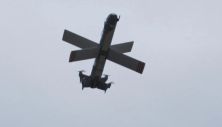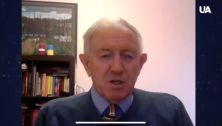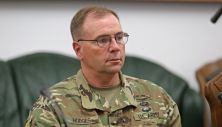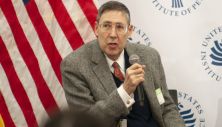— People often say Russia is a juggernaut—some think it’s a paper tiger, though. How is Ukraine faring in Kherson? Any insights?
— Of course, without access to Ukrainian intelligence, I can’t say for sure. But after nearly four months, Russia has not been able to eliminate the Ukrainian bridgehead or eradicate this threat inside its borders.
This creates a serious problem for the Kremlin: do they leave it there, commit more resources, or continue operations in the east? This remains a strategically sound operation for Ukraine.
— Moving to American politics. Fox TV host Pete Hegseth is rumored to be considered for Defense Secretary. How likely is his confirmation by the Senate?
— It’s an important question. As you know, the U.S. Constitution requires Senate consent for presidential nominees. This will be an early test for the new Senate majority leader on whether they will insist on thorough confirmation processes or bypass them.
Every administration faces resistance to controversial nominees. What’s unique here is the number of nominees without traditional qualifications. It will be critical for the Senate to fulfill its constitutional duty.
— You live in Germany. With current political turbulence, how likely is Friedrich Merz to become Chancellor?
— Polling indicates the CDU and CSU are poised to win the election, which would make Mr. Merz the next Bundeskanzler after forming a coalition. This scenario seems most likely based on current trends.
— Would this be good for Ukraine?
— Certainly. Mr. Merz has voiced strong support for Ukraine and even stated he would approve Taurus missile systems for Ukraine if Russia doesn’t stop its aggression. His leadership could strengthen Germany’s stance on European security and stability while countering Russian intimidation.
— Is a war between South and North Korea imminent?
— I don’t think so. North Korea is testing South Korea, but deterrence is essential. The U.S. and its Indo-Pacific allies must make clear their commitment to defending South Korea.
Sanctions alone won’t change North Korea’s behavior. Strategically, helping Ukraine defeat Russia could further isolate Kim Jong-un and weaken his regime.
— Militarily, how significant is the force Trump mentioned in Europe when discussing Russia?
— The U.S., alongside European and Canadian allies, has substantial land forces capable of defeating any Russian attack. However, there’s a need for stronger air and missile defense to protect critical infrastructure and populations.
Russia is already at war with the West—not just kinetically, but through disinformation, cyberattacks, and election interference. Recognizing this sooner will help the West develop effective policies to counteract Russian aggression.
— Is Putin bluffing about being able to go to war with NATO and win?
— That’s part of Russia’s strategy. Their nuclear threats aim to influence Western decision-making, creating fear and self-deterrence. This tactic seeks to pressure the West into concessions and shift the advantage to Russia in any negotiations.
— Finally, Ukrainian media sometimes indiscriminately criticizes figures they should be turning into allies, like a U.S. president. What advice would you give Ukrainian journalists?
— The media’s job isn’t to create allies but to report facts and offer analysis. Criticism should be factual and constructive, especially when addressing foreign leaders.
While it’s vital to hold leaders accountable, the way criticism is framed can either help or harm Ukraine’s interests. Recognizing this balance is crucial for effective journalism.
Read also: European Commissioner for Space Defense – Trump Impersonates Reagan










